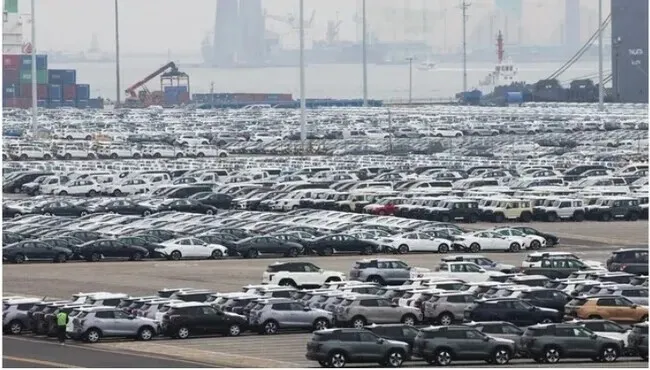hankyoreh
Links to other country sites 다른 나라 사이트 링크
Local firms predict China will outcompete Korea in all major industries, including chips, by 2030

Domestic corporations working in export industries predicted that South Korea is poised to fall behind China in all 10 of its mainstay areas by 2030.
The corporations anticipated that South Korean businesses would be overtaken by China within five years — even in industries where they currently hold a competitive advantage, including semiconductors, electronics and shipbuilding.
The Federation of Korean Industries announced Monday the findings of a recent survey it had commissioned from Mono Research, which questioned 200 businesses in South Korea’s top 10 mainstay industries — including semiconductors and automobiles — from the top-ranked 1,000 in terms of domestic sales.
The survey findings showed that 62.5% of all companies that responded named China as South Korea’s biggest export competitor at present, followed by the US (22.5%) and Japan (9.5%).
Similarly, 68.5% predicted that China would be South Korea’s biggest export competitor in the year 2030, suggesting that the competition with China for exports will only intensify.
On a scale where a value of 100 represented the current competitiveness of South Korean companies, the responding businesses rated the US’ competitiveness at 107.2, China’s at 102.2, and Japan’s at 93.5. With larger numbers signifying greater competitiveness, the ratings mean that they viewed China as having already surpassed South Korea.
Broken down by sector, China was seen as surpassing Korea in competitiveness in five areas: steel (112.7), regular machinery (108.5), secondary batteries (108.4), displays (106.4), and automotives and auto parts (102.4). In effect, Korean firms saw China as more competitive than domestic industries in five of Korea’s top 10 export items.
Korean businesses forecast that by 2030, China would have a competitiveness of 112.3 — within spitting distance of the US 112.9 — and that it would surpass Korea in all 10 major export areas. That is, Korean firms saw themselves falling behind their Chinese competitors in semiconductors, electrics and electronics, ships, petrochemicals and petroleum products, and biomedical and health products.
The survey further found that companies that had singled out China as Korea’s biggest competitor considered China to be more competitive than Korea in nearly all areas — from price to productivity, governmental support, expert workforce and core technologies — aside from brand image.
Domestic firms saw deteriorating competitiveness of domestic products, heightened external risk factors, sluggish domestic demand, and a dearth of experts in key technologies like AI as the main hurdles to boosting Korean businesses’ competitiveness.
The surveyed businesses said that to solve this problem would require government action in the form of reducing external risks, building up a system for fostering workforces in core sectors, expansion of investment in future technologies, and measures to increase economic efficiency, such as easing regulations and cutting taxes.
By Park Jong-o, staff reporter
Please direct questions or comments to [english@hani.co.kr]

Editorial・opinion
![[Column] What the media’s Mamdani-bashing missed [Column] What the media’s Mamdani-bashing missed](https://flexible.img.hani.co.kr/flexible/normal/500/300/imgdb/original/2025/1119/8917635396484299.jpg) [Column] What the media’s Mamdani-bashing missed
[Column] What the media’s Mamdani-bashing missed![[Column] Another Eulsa Year, another blow to Korea’s sovereignty [Column] Another Eulsa Year, another blow to Korea’s sovereignty](https://flexible.img.hani.co.kr/flexible/normal/500/300/imgdb/original/2025/1119/7417635391901154.jpg) [Column] Another Eulsa Year, another blow to Korea’s sovereignty
[Column] Another Eulsa Year, another blow to Korea’s sovereignty- [Editorial] South Korea is not a US outpost
- [Column] Trump’s kingdom, Xi’s empire
- [Column] Putting the ‘demos’ back in democracy
- [Editorial] Prosecutors’ selective outrage is self-incriminating
- [Column] Korea’s ‘republic of lawyers’ is only making things worse
- [Column] Trump should win Nobel War Prize
- [Editorial] Boozing, luxe gifts, playing royalty: Yoon and Kim must pay for privatizing power
- [Column] Korea’s young men need liberating too
Most viewed articles
- 1What Pyongyang’s response to US-SK security agreements signals
- 2[Column] Another Eulsa Year, another blow to Korea’s sovereignty
- 3Tokyo-Beijing ties hit a postwar low in 2012 island dispute — this time, it may be worse
- 4Korea signs on to UAE Stargate initiative to create world’s largest AI infrastructure
- 5[Column] What the media’s Mamdani-bashing missed
- 6Local firms predict China will outcompete Korea in all major industries, including chips, by 2030
- 7Japanese woman charged with indecent assault for forcibly kissing Jin of BTS
- 8An upside-down map of East Asia could reshape US military policy in region
- 9Korea wins annulment in dispute with Lone Star, no longer obligated to pay compensation
- 1069% of Koreans use Galaxy phones, but majority of 20-somethings prefer iPhones